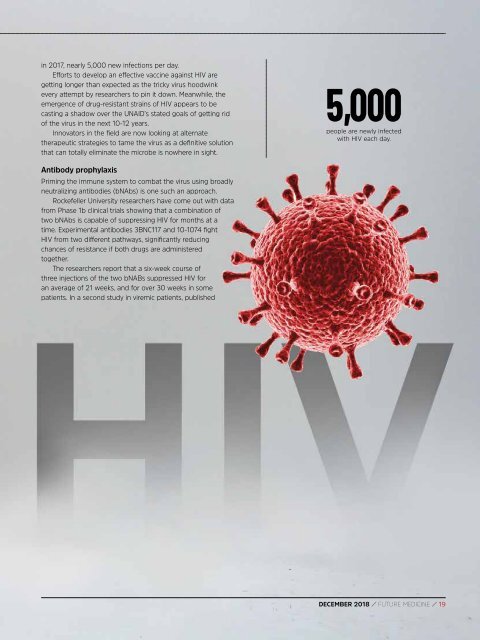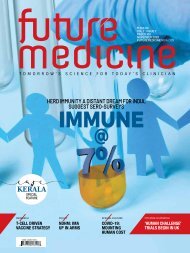FM DECEMBER 2018 ISSUE - digital edition
You also want an ePaper? Increase the reach of your titles
YUMPU automatically turns print PDFs into web optimized ePapers that Google loves.
in 2017, nearly 5,000 new infections per day.<br />
Efforts to develop an effective vaccine against HIV are<br />
getting longer than expected as the tricky virus hoodwink<br />
every attempt by researchers to pin it down. Meanwhile, the<br />
emergence of drug-resistant strains of HIV appears to be<br />
casting a shadow over the UNAID’s stated goals of getting rid<br />
of the virus in the next 10-12 years.<br />
Innovators in the field are now looking at alternate<br />
therapeutic strategies to tame the virus as a definitive solution<br />
that can totally eliminate the microbe is nowhere in sight.<br />
5,000<br />
people are newly infected<br />
with HIV each day.<br />
Antibody prophylaxis<br />
Priming the immune system to combat the virus using broadly<br />
neutralizing antibodies (bNAbs) is one such an approach.<br />
Rockefeller University researchers have come out with data<br />
from Phase 1b clinical trials showing that a combination of<br />
two bNAbs is capable of suppressing HIV for months at a<br />
time. Experimental antibodies 3BNC117 and 10-1074 fight<br />
HIV from two different pathways, significantly reducing<br />
chances of resistance if both drugs are administered<br />
together.<br />
The researchers report that a six-week course of<br />
three injections of the two bNABs suppressed HIV for<br />
an average of 21 weeks, and for over 30 weeks in some<br />
patients. In a second study in viremic patients, published<br />
<strong>DECEMBER</strong> <strong>2018</strong> / FUTURE MEDICINE / 19


















